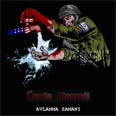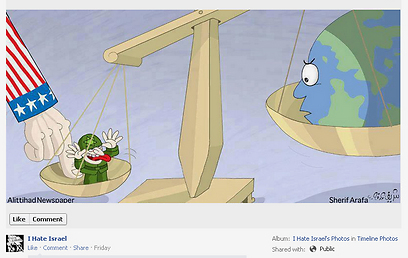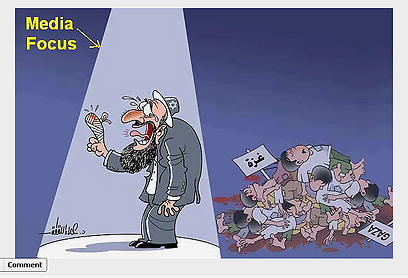
Anti-Semitism in information era
Holocaust denial, anti-Zionism conspiracy theories and hostility towards Israel – a marginal phenomenon or a new wave of hatred sweeping the Web?
Another website insists that the 9/11 terror attacks were a "Zionist conspiracy," providing arguments from the Protocols of the Elders of Zion, the New Testament and the Bible.
Holocaust denial and Israel hatred can be found all over the Internet, and it seems a person interested in finding information about Israel and Judaism cannot help but running into them. But what is the exact extent of the phenomenon, how is it reflected and can anything be done to deal with it?
Anti-Semitism in academic guise
"While in the world there are only close to 100 'professional' Holocaust deniers, the Internet is creating a phenomenon of empowering the issue of anti-Semitism and racism throughout the years," says Eli Hacohen, a journalist and the professional director of the Orange Institute For Internet Studies at Tel Aviv University.
Hacohen has been investigating the Web's cultural-social effects and closely monitoring the issue of online anti-Semitism for the past 18 years.
"The large companies at the core of the Internet allow the racist and anti-Semitic activity to take place, raising many questions," he notes, adding that "since the establishment of the first anti-Semitic website in 1995, Stormfront.org, we can see a clear trend of development and increase in online anti-Semitism."
There are many examples, the most blatant and irritating ones appearing in the academic world: While in the past the works of Holocaust deniers were restricted to hate and incitement groups, or to disgraced academics, today's search engines led by Google – and its academic version Google Scholar – provide easy access to "academic publications" denying the Holocaust.

"This institute sends a clear message on the Web: Let's engage in a legitimate argument on whether there was even a Holocaust in the middle of the previous century or not," he states. "Another example is the search engines. A simple search of the word 'Jew' in Google will lead to first-page results like anti-Semitic website Jew Watch.
"My greatest concern is the educational and factual aspect, and the fact that students and children are exposed to a lot of hateful content, without their parents and educational institutions being able to deal with this phenomenon."
Memes of hatred
It appears that racist activity and hate groups have always been and will continue to be on the Internet, but is it actually a growing phenomenon which should raise real concern?
According to Hacohen, despite the difficulty to point to accurate data and empirical measures in Web research, there seems to be a real cause for concern: "If in the past a search of clear anti-Semitic terms like 'Israhell' and 'holohoax' would give you about 10,000 results, now we are talking about close to one million results."
The activity is not restricted to search engines. A new report by the Australian Online Hate Prevention Institute points to a real anti-Semitic bloom on the leading social networks: Twitter, Instagram and Facebook.
The report, authored by Dr. Andre Oboler, describes a phenomenon of "cyber-racism" and a constant increase in the number of complaints received by the Australian Human Rights Commission in regards to racist and anti-Semitic material on the Internet.

Another example is a Facebook page which aims to present the Protocols of the Elders of Zion and other conspiracy theories in regards to Judaism and Zionism. The report notes that the anti-Semitic activity is also directed at Facebook's Jewish founder, Mark Zuckerberg, with one hate page calling for him to be beheaded.
Hackers vs. Israel
The anti-Semitic activity on the Web is not only expressed in hate groups and offensive publications, but in hacking activity as well. Despite the commotion and attention the hate groups attract, most of the anti-Semitic activity involving breaking into websites is not particularly sophisticated: Hackers interested in promoting an anti-Semitic ideology advance and improve search results (search engine optimization) in order to promote racist and anti-Israel content.
This activity, nicknamed "Black SEO", uses methods ranging from dubious to illegal in order to lead a person searching for information on Holocaust commemoration to websites engaging in Holocaust denial.

Taking advantage of law's limitations
Like in other cases of cyber crimes, such as piracy and pornography, the legal and law enforcement authorities are facing real difficulties dealing with the problem. The global nature of the Internet makes it very difficult to create clear laws and enforcement rules which will stop and limit the distribution of malicious content, and cyber-racial activity tends to originate in countries with more lenient regulations.
Eli Hacohen explains that "while in Europe there is tighter supervision of such activity, in the US there are more lenient arrangements in terms of freedom of expression, and so many hate websites operate from there. One of the main problems in my opinion is the failure to reach an international treaty on incitement and anti-Semitism on the Web."
While the core of the activity of Holocaust deniers is still restricted to relatively small radical groups, the exposure and the viral effect of the Internet, which are sometimes a positive and efficient factor, act as a two-edged sword in this case, leading to a widespread distribution of harmful ideas.
Alongside legal sanctions, it seems more can be done to fight the phenomenon. Indeed, there are websites acting under the banner of fighting Holocaust deniers, led by the Simon Wiesenthal Center and the Anti-Defamation League, but the social networks, where most of the unrestrained activity is concentrated, serve as a sort of "Wild West" of incitement, requiring immediate attention.










